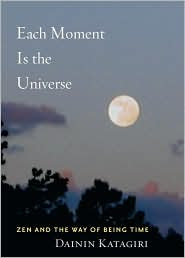
In the current issue of Tricycle magazine, the poet John Giorno at the wise age of 70 is thankful for much, even for the nation's creative negativity ("America, thanks for the neglect, I did it without you, let us celebrate poetic justice," he writes in the amusing, biographical "Thanks 4 Nothing"). It's a lesson for all well-intentioned writers in this age of celebrated blockbusters and media events: just find your way carefully, calmly, avoiding the trap of deliberate nostalgia: "It was wonderful that we loved each other / but I do not want any of them back ... " In other words: take your time.
And from Daigin Katagiri (1928-1990) comes the following advice about the nature of time itself. It's a pleasant rumination on a fall night, as the stars come into view and the moon rises above the trees. I read until the light from the candle fails or the cat jumps into my lap and reminds me that it's his dinnertime. Both are insistent markings of time's passage more sure than any clock. Reprinted in Tricycle from his book Each Moment is the Universe (2007, Shambhala Publications) Katagiri writes:
"Usually we think of time in the common sense, as a stream running from the past through the present to the future. We think that way because we base our idea of time on the law of cause and effect. If someone hits you, you feel pain, so your human consciousness creates an idea of time that connects the past, present, and future. Then you believe that time is passing quickly and is characterized by the continuous existence of separate beings.
But that is a narrow understanding of time, which creates lots of problems and lots of suffering, because when you think about time that way, you become egoistic. You believe that another person’s time is separate from yours and that you only have to take care of your own time. Then you feel isolated and cold. You don’t feel a warm relationship with other people or beings, and you can easily hurt them.
When we see human life only from that narrow view of time, we are blind to the total picture of time. This is a big problem. It is like always climbing a mountain and never seeing the mountain from a distance. Sometimes, to understand the life of the mountain, you have to see the beauty of the mountain as a whole, connected with the clouds and the sky. We cannot ignore or escape from the stream of time. We must be there. But we cannot be blind.
In Shobogenzo, “Uji” (Being-Time), Dogen Zenji says: Open your eyes and let’s see time from a different angle! When you see your life from the broad view of time, you see that your life is not something separate from time — your life is time.
It is very important to see your life not only from the narrow view of your egoistic telescope but also from the broad view of the universal telescope called egolessness. This is why we have to practice. Right in the middle of the stream of time, we have to open our eyes there and see the total picture of time. Through spiritual practice we can go beyond our egoistic point of view. We can touch the core of time, see the whole world in a moment, and understand time in deep relationship with all beings. Then we cannot be isolated and cold people. We become beautiful and warm people, appreciating and helping all beings."






No comments:
Post a Comment